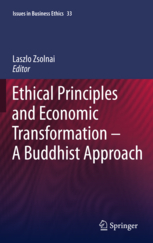Laszlo Zsolnai (Ed.): Ethical Principles and Economic Transformation – A Buddhist Approach. Springer, 2011. (This book may be available at Springer)
 The book presents new contributions of Buddhist economics to pressing socio-economic problems. Buddhism points out that emphasizing individuality and promoting the greatest fulfillment of the desires of the individual conjointly lead to destruction. The book promotes the basic value-choices of Buddhism, namely happiness, peace and permanence.
The book presents new contributions of Buddhist economics to pressing socio-economic problems. Buddhism points out that emphasizing individuality and promoting the greatest fulfillment of the desires of the individual conjointly lead to destruction. The book promotes the basic value-choices of Buddhism, namely happiness, peace and permanence.
Happiness research convincingly shows that not material wealth but the richness of personal relationships determines happiness. Not things, but people make people happy. Western economics tries to provide people with happiness by supplying enormous quantities of things and today’s dominating business models are based on and cultivates narrow self-centeredness.But what people need are caring relationships and generosity. Buddhist economics makes these values accessible by direct provision. Peace can be achieved in nonviolent ways. Wanting less can substantially contribute to this endeavor and make it happen more easily. Permanence, or ecological sustainability, requires a drastic cutback in the present level of consumption and production globally. This reduction should not be an inconvenient exercise of self-sacrifice. In the noble ethos of reducing suffering it can be a positive development path for humanity.
Ethical Principles and Economic Transformation – A Buddhist Approach preface
Ethical Principles and Economic Transformation – A Buddhist Approach introduction
Ethical Principles and Economic Transformation – A Buddhist Approach conclusion